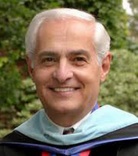 With a decision on the future of City College of San Francisco due as early as Wednesday afternoon, most community college leaders are optimistic that the credentialing commission that ordered the college to “show cause” as to why it shouldn’t be shut down will allow City College to keep its accreditation and possibly move it to a lower level of sanction.
With a decision on the future of City College of San Francisco due as early as Wednesday afternoon, most community college leaders are optimistic that the credentialing commission that ordered the college to “show cause” as to why it shouldn’t be shut down will allow City College to keep its accreditation and possibly move it to a lower level of sanction.
“Everybody thinks it’s a foregone conclusion that it (City College) will be moved to probation, and I think that, too,” said Ron Galatolo, chancellor of the neighboring San Mateo Community College District.
For the past year, the 85,000 student City College, the largest in the state, has been engaged in an intensive process to keep its doors open.
The Accrediting Commission for Community and Junior Colleges (ACCJC) notified City College in a July 2, 2012, letter that it had been placed on the most severe sanction, and ordered the college to “show cause” as to why it should not lose its accreditation, citing a range of fiscal, management and other concerns. Two lesser sanctions that the commission could impose are probation and warning status, the lowest level.
Placing a college on probation means it has “deviated significantly” from those standards. A warning means that a college has “deviated” from the commission’s requirements for eligibility and other standards.

Robert Agrella
Bob Agrella, the special trustee appointed to guide City College through the renewal process, said probation would be the best they could hope for given the amount of work that still needs to be done to meet all the commission’s concerns, based on its most recent report. That report remains confidential. Agrella was part of a small group of City College leaders given time at last month’s ACCJC meeting for a final opportunity to provide details of the progress they’ve made, particularly since April, when a commission review team visited the campus. The commission voted in closed session on the fate of City College and 45 other western colleges under review.
“We told them about moving on with the planning and budgeting process, clarified that we were moving along with the participatory governance process in the institution and we told them we were very pleased with the progress we’d made in student learning outcomes and how that had been embraced by the faculty,” Agrella said.
The Commission had 30 days after that vote — until this Sunday, July 7 — to release its ruling. Anyone who knows the final verdict on accreditation has so far refused to comment, leading to a lot of hearsay.
“What we’ve heard is anecdotal,” said Chris Hanzo, executive director of AFT Local 2121, which represents the City College faculty. “We think we’ll continue on sanction, possibly ‘show cause’, which would be very bad.”
Karen Saginor, president of the City College of San Francisco Academic Senate, suspects the college will be placed on probation, but said she wouldn’t exclude anything at this point. “Because the issue is so politicized, I can see anything from taking away accreditation to probation,” Saginor said.
Moving to probation or remaining on “show cause” status would effectively give the school more time to take care of the issues identified by the Commission, but not an unlimited amount of time. A federal law, known as the “two-year rule,” requires an accreditation commission to revoke accreditation from a college if it hasn’t complied with standards within that period of time, no matter what level of sanction they’re on.
The commission is facing its own review regarding its recognition as an accrediting agency by the federal government, which may be affected by a nearly 300-page complaint filed by the City College faculty union alleging, among other charges, a conflict of interest because the ACCJC president’s husband was on the City College evaluation team. Although the commission has rejected the charges, the U.S. Department of Education sent a letter to the commission president earlier this month, asking for more documentation to show that it’s in compliance with its own standards.
The union escalated its allegations against the commission on Tuesday, filing an amended complaint with additional charges.
To get more reports like this one, click here to sign up for EdSource’s no-cost daily email on latest developments in education.














Comments (1)
Comments Policy
We welcome your comments. All comments are moderated for civility, relevance and other considerations. Click here for EdSource's Comments Policy.
Homer Teng 11 years ago11 years ago
As San Francisco is a city of immigrants, English-as-a-Second Language (ESL) education is critical for many families to advance economically. CCSF is the largest ESL education provider in the City, serving 25,000 students annually. Yet according to CCSF's own statistics, only 9% of all students in ESL Levels 1-4 (beginning) make it to Level 5 (intermediate). Since career and technical education programs begin at Level 5, that means 91% of CCSF ESL students are ineligible … Read More
As San Francisco is a city of immigrants, English-as-a-Second Language (ESL) education is critical for many families to advance economically. CCSF is the largest ESL education provider in the City, serving 25,000 students annually. Yet according to CCSF’s own statistics, only 9% of all students in ESL Levels 1-4 (beginning) make it to Level 5 (intermediate). Since career and technical education programs begin at Level 5, that means 91% of CCSF ESL students are ineligible – and will be ineligible in the future – to enter job training programs.
The above statistics paint an alarming picture of an institution that is in need of significant change. While there are many individual dedicated teachers and some caring administrators at CCSF, the system as a whole is not producing the kind of results that would improve the economic well-being of many immigrants.